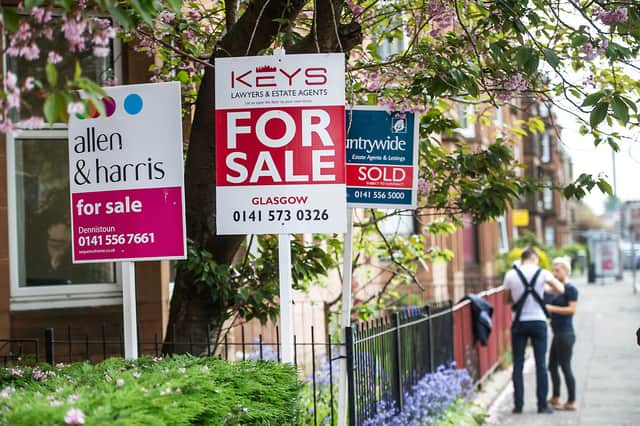Buyers and sellers will require a dose of realism - David Alexander


Looked at in relative terms, however, the increase is substantial, even if it comes from such a low base that the various increases in mortgage payments which will inevitably follow are unlikely to drive a coach and horses through household budgets.
Of more concern is that this increase could be just the start of a trend, with more rises likely during 2022; if true, by next summer some homeowners with mortgages could be paying substantially more than they are at present.
Advertisement
Hide AdAdvertisement
Hide AdIt is said in some quarters that the last thing an economy emerging from the effects of a two-year pandemic needs is higher interest rates but the Bank of England seems genuinely concerned about the rate of inflation (as much as 6pc has been forecast) and clearly nipping this in the bud is seen as of equal importance.
There are several reasons for the current bout of inflation, among them higher wages caused by staff shortages and supply and distribution issues increasing the price of various products. These problems in themselves are not insurmountable and may be temporary but even so 2022 could be something of a rough ride – especially once the “cap” on energy prices comes up for review in the spring. It does therefore seem inevitable that a combination of dearer mortgages and a general rise in the cost of living will ripple out – in a negative way – to the housing market.
For the majority of owner-occupiers with no intention of moving house during the next 12 months it will simply be a case of battening down the hatches and seeing things through. However those for whom family, financial or career circumstances demands or suggests a new abode, will require patience, reliance and, perhaps most important of all, facing up to the “new realism”.
Over the past 18 months most home-owners – whether movers or not – have seen a remarkable increase in the value of their asset class, something that has confounded the markets given the warnings of doom and gloom at the start of the pandemic back in March 2020.
However as 2008 – and previous periods which may now be recalled only by older readers – showed only two clearly, exponential increases in house prices are not inevitable. While the historical trend is ever-upward, values do fall back from time to time, which can leave any homeowner attempting to sell during such a glitch understandably feeling cheated.
Consequently, I worry that a forthcoming slowdown in the housing market may be compounded by people’s unrealistic expectations as to how much their properties will be worth in 2022 compared to 2021.
Let us take the example of house which was valued at £400,000 in the summer of this year. The owner decides to put it up for sale in May or June next year and expects to achieve at least as high a price as the earlier valuation. And no matter what the Home Report recommends, he will stubbornly stick at that figure, despite market conditions having altered significantly in the intervening 12 months. The result is no sale and, of course, no onward purchase of a replacement property. If this example is repeated often enough you start to see a localised market logjam.
In these circumstances, vendors will need to look at the bigger picture. Because everyone is in the same boat, selling and buying in a rising market go hand in hand in which case any excessive surplus gained from the sale is diminished by the additional cost of the replacement property. In a flatter market the same principle applies, only in reverse: you may have to sell at a lower price but the property you buy is likely to be more affordable.
Advertisement
Hide AdAdvertisement
Hide AdTherefore those thinking of moving home in a more difficult 2022 (either out of necessity or simply because they fancy a change) need to ask themselves just one vital question: not what will I get for my present house but how much, in net terms, will it cost to move to a new one?
Finding the right answer should result in a relatively angst-free transaction – whatever else is happening to the wider economy.
David Alexander is managing director of DJ Alexander.
Comments
Want to join the conversation? Please or to comment on this article.